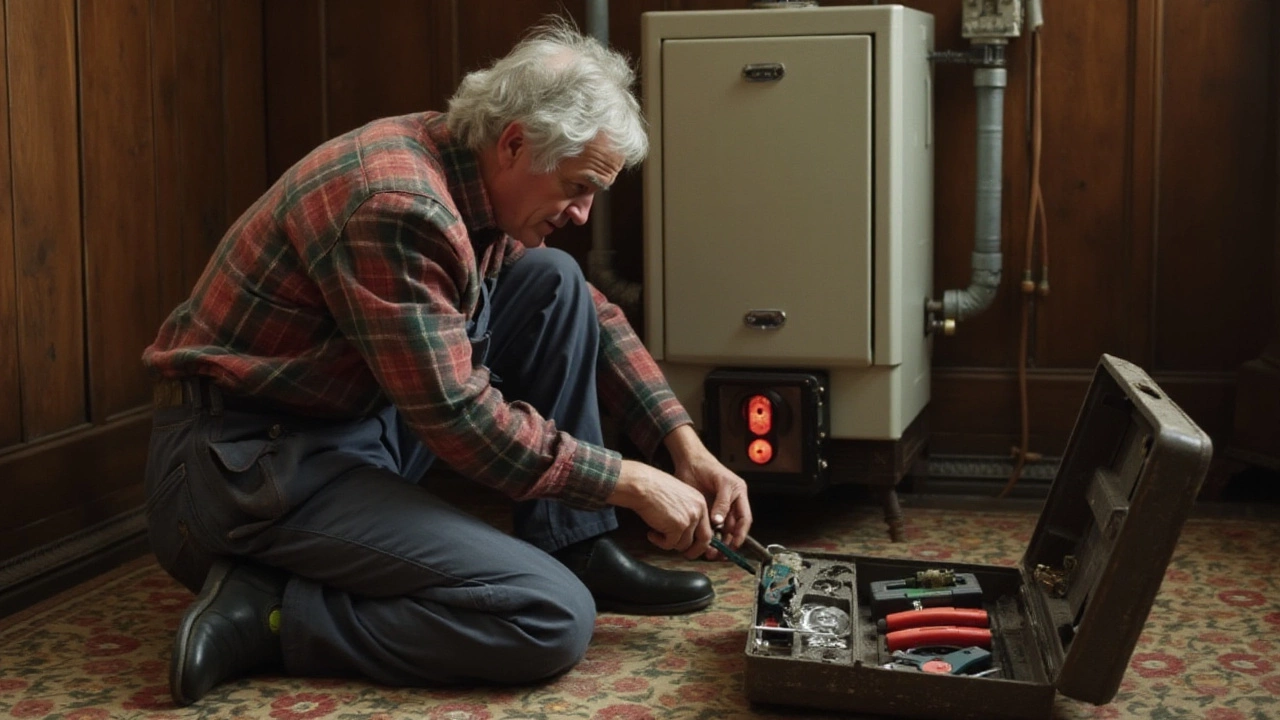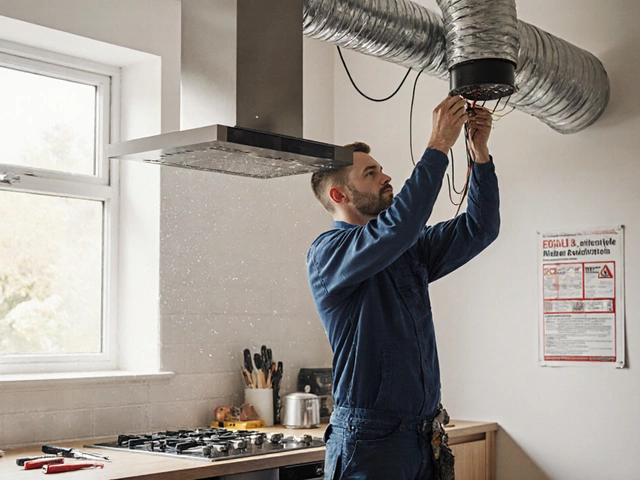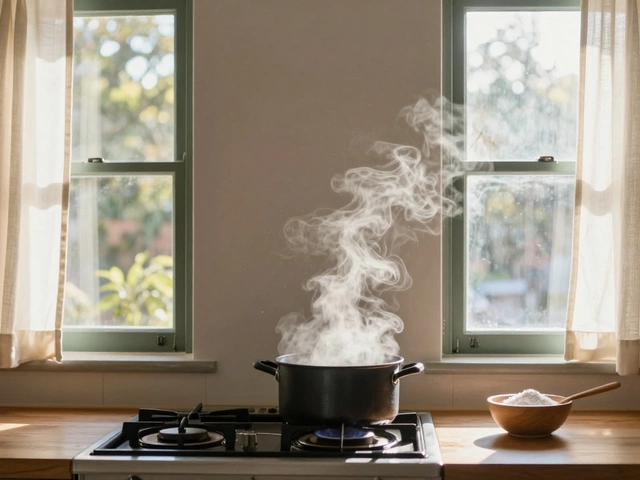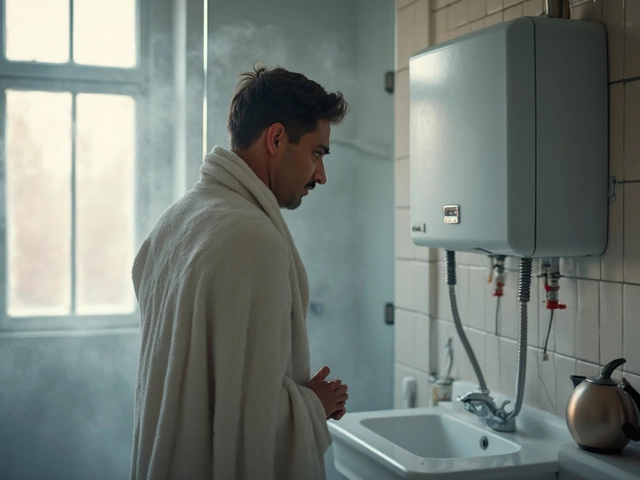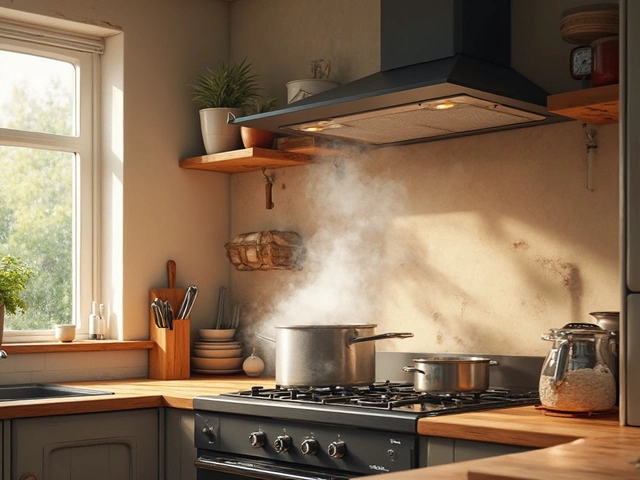In a world where nearly everything has an expiry date, the concept of a boiler lasting 50 years sounds almost like a fairytale. Yet, as heating technology has evolved, so too has the potential lifespan of these trusty household workhorses. The question of whether a boiler can last half a century is not just a matter of age but of care, advancements, and circumstances.
Boilers, like fine wine, could potentially improve with the passage of decades if fostered under the right conditions. This means savvy homeowners and diligent caretakers can play a pivotal role in pushing the boiler's boundaries. Interestingly, some models from decades past have been known to defy expectations, heating homes steadily through the years.
However, achieving such remarkable endurance isn't solely about luck or brand reputation. It's about understanding the dynamics of your boiler's inner workings, adapting to technological innovations, and maintaining a meticulous upkeep routine. Join us as we explore the possibilities and unravel the mystery behind boilers that seem to be evergreen.
- The Longevity of Boilers
- Importance of Regular Maintenance
- Technological Advancements in Boilers
- Tips for Extending Boiler Life
The Longevity of Boilers
Boilers are often seen as the steadfast backbone of home heating systems. Their ability to last for decades is a testament to solid engineering and robust designs. While it's not unheard of to come across a boiler that has served a home well for 50 years, several factors contribute to their longevity. The key here lies in understanding how these systems work and what conditions allow them to exceed their expected lifespan, which typically ranges around 10 to 15 years for modern units. Older models, however, were built with different priorities, often focusing more on durability and less on energy efficiency.
When we examine the boiler lifespan, the comparison between today's systems and those from yesteryears becomes apparent. Back then, boilers were constructed with more metals and fewer electronics, leading to less wear from electronic failures. A critical aspect of these early models was simplicity, a factor that has curiously contributed to their lasting power. But this simplicity came at the cost of higher operational expenses, as newer systems are designed to be more energy-efficient. Yet, if nurtured with care, the elementary robustness of older systems allows them to heat homes reliably for half a century in some cases.
Proper use and regular maintenance play enormous roles in achieving such longevity. It's not just about design; boiler maintenance can make or break the potential for a long life. Homeowners who schedule annual checks, address issues promptly, and replace parts as needed are investing in their boiler's future. Consider a farmer tending to his crops year after year; the harvest yields benefits from this dedication. Similarly, a boiler anticipates its lifespan with frequent love and attention. It becomes a determined cycle of giving and receiving care. And often, as home engineers and experts suggest, a well-maintained boiler can literally outlive its newer counterparts.
Among the quoted industry veterans, it is commonly heard how 'A boiler that receives the right kind of fuss can age with grace,' as said by James H. Carson, a respected voice in heating solutions.
James H. Carson, heating solutions expert: "A boiler is like a reliable old car; with consistent loving care, it can run for decades."This perspective gives homeowners hope that their heating systems can serve them beyond the standard years set by engineers. As modern boilers emphasize sustainability and eco-friendly practices, it's vital to understand that efficiency doesn't necessarily equate to longevity but aims at optimizing resources during a boiler's traditional operational period.
To wrap up the discussion on longevity, a comparison of classic versus contemporary boilers isn't about which is better per se but understanding how they can be nurtured for maximum boiler longevity. It's an interplay of respecting traditional wisdom while embracing innovations for better energy usage. Thus, whether you're living with a time-tested appliance or considering modern technology, the key takeaway is to recognize and act on the significant role of commitment and quality care for your boiler's long-term performance and reliability.

Importance of Regular Maintenance
The journey to achieving a boiler lifespan that might outlast your mortgage is paved with frequent and meticulous boiler maintenance. Think of your boiler like a car engine. Just as a car requires routine oil checks, tire rotations, and inspections to run smoothly, a boiler needs similar attention. Failing to give it the care it needs can lead to inefficiencies, costly repairs, or even the untimely demise of your heating system.
Regular maintenance involves a series of proactive measures designed to prevent minor issues from spiraling into significant problems. It includes checking for leaks, ensuring controls and safety devices work appropriately, and cleaning out any soot or debris that could obstruct the flow within the system. This keeps your heating systems functioning at peak efficiency, an attractive prospect considering the cost of energy bills these days. Not only does this regular upkeep minimize disruption to your heating supply, but it also enhances the boiler longevity, potentially giving your unit the fighting chance to reach that coveted 50-year mark.
The eco-friendly factor is another compelling reason for routine maintenance. Boilers that run efficiently produce less waste, meaning fewer emissions and a smaller carbon footprint. This is a critical consideration, especially as households and governments alike seek out ways to combat climate change. Maintaining your boiler is, therefore, not only beneficial for your household budget but also for the planet.
Consider the words of the Energy Saving Trust, which emphasizes, “A well-maintained boiler can be as much as 10% more efficient than a neglected one.” By simply scheduling regular checks, you're making an investment that pays dividends in terms of energy savings and peace of mind.
What's more, regular inspection helps uncover issues such as corrosion before they're widespread, which could demand extensive—and expensive—repairs. It prevents small drips from turning into major leaks or minor blockages from creating severe inefficiencies in your entire heating system. When a certified technician looks over your boiler, they can fine-tune components to optimize performance, much like tuning a piano to ensure each note sounds as it should.
There's a rhythm to the boiler's lifecycle, and regular maintenance is like conducting an orchestra. Each check-up is like a rehearsal, preparing the boiler for the performance of its lifetime in the long, cold months of winter. Through conscientious care, you not only extend the lifespan of your boiler but also secure a more comfortable home environment for years to come. So, when those colder months roll in, you can rest easy knowing that you've done everything possible to keep your boiler humming along happily.

Technological Advancements in Boilers
As time has marched forward, so has the technology driving our trusty home heating systems. The days when boilers were hulking, inefficient giants are increasingly a thing of the past. Instead, today's boilers are wonders of modern engineering. They are designed not just for exceptional performance but for efficiency and environmental consciousness as well. Over the decades, one of the most significant improvements in boiler maintenance and technology has been the shift toward condensing boilers. These ingenious devices cleverly use their waste heat to preheat the cold water entering the boiler, wringing out every last drop of energy before venting gases outside. This innovation means better fuel efficiency and reduced emissions, which is music to the ears of both eco-conscious consumers and budget-savvy homeowners.
Another impactful shift has been the introduction of smart boilers equipped with technology that communicates with the rest of your home's smart systems. A smart boiler can learn your habits, adapt to your schedule, and even troubleshoot problems before they escalate into expensive repairs. This not only extends the lifespan of boilers but also ensures that maintenance isn't overlooked. From a simple smartphone app, homeowners can now tweak settings, receive alerts, and even schedule repairs, making daily boiler operation a breeze. In fact, the convenience offered by these technologies, combined with enhanced boiler longevity, has reshaped how we view home heating systems.
As stated by the Department of Energy, "Modern-day boilers have realized efficiency levels unheard of just a few decades ago, contributing significantly to reduced energy consumption in residential applications."
The durability and resilience of boilers have also seen improvements through the advent of advanced materials and construction techniques. Boilers today utilize stainless steel and high-grade aluminum to prevent corrosion and improve heat exchange efficiency. Additionally, innovations like modulation burners allow boilers to run at variable output levels, just enough to meet the current heating needs. This not only reduces wear and tear on the boiler's components but also plays a pivotal role in extending the appliance's life. Manufacturers continue to push boundaries, with each technological stride promising yet greater efficiency and reliability. As you consider investing in your next boiler or evaluating the viability of your current unit, keeping abreast of these advancements can help you make informed decisions.
For those contemplating boiler replacement, it's worth reviewing some comparisons of model efficiency and durability, which are often available in helpful boiler lifespan data charts. This creates a landscape where buyers can critically assess their long-term investment, considering both immediate needs and future-proofing their purchase. The goal is to achieve a harmony between technological advancements and sustainable home heating that beautifully balances budget, comfort, and conscience. As the technology continues to evolve, the prospect of a boiler lasting 50 years no longer seems entirely out of reach.
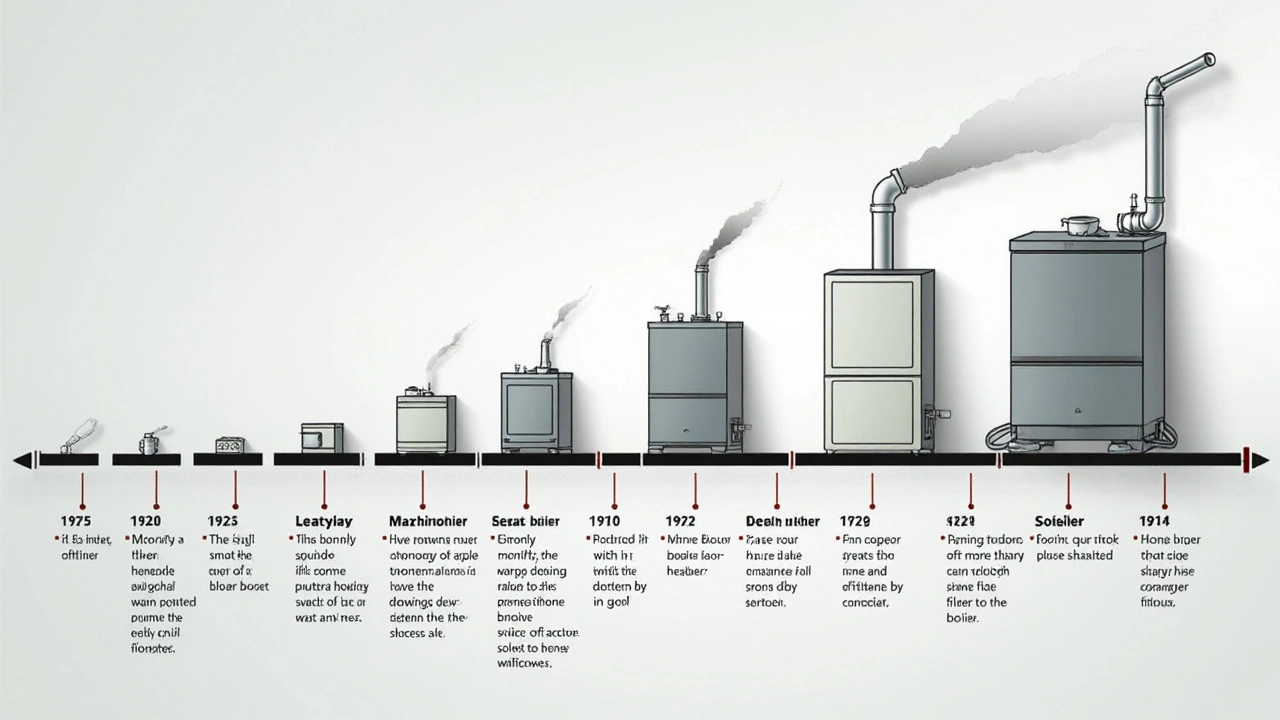
Tips for Extending Boiler Life
Thinking about keeping your boiler running for several decades? It might sound ambitious, but with the right measures, it's actually quite possible. First and foremost, regular maintenance is key. This isn't just about calling the professionals for an annual check-up, although that's certainly crucial. Instead, think of it as a continuous process. Listen for strange noises, monitor energy consumption rates, and keep an eye out for any unusual smells. These small day-to-day observations can catch small issues before they become expensive problems. Additionally, it's wise to bleed your radiators periodically to release any trapped air, which ensures efficient heating performance.
Another important aspect is managing operational stress. Just like the human body, pushing your heating system to its limits frequently can cause undue strain. Setting the thermostat to moderate levels and avoiding excessively high temperatures can help prolong the life of your boiler. If you're planning a long absence, it's better to maintain low-level heating rather than switching off completely, preventing your system from having to work extra hard upon your return. In the words of renowned HVAC expert John Harrison,
"A boiler's lifespan is directly proportional to the care and attention it receives; small investments in time and effort can yield years of additional service."
Prioritize Energy Efficiency
Energy efficiency isn't just an environmental buzzword, it plays a critical role in extending your boiler's life. Consider upgrading to a smart thermostat, which learns your habits and adjusts heating schedules accordingly. This optimizes energy use without sacrificing comfort. Additionally, lagging your pipes with insulation prevents heat loss, reducing the boiler's workload. Replacing traditional radiators with larger panels can also distribute heat more evenly, ensuring your system isn't straining to heat an overly spacious area. Keep your boiler clean and free of dust buildup, as debris can affect airflow and efficiency. Low efficiency means your boiler works harder, thus aging faster.
Invest in Quality Repairs and Parts
When it comes to repairs, cutting corners is rarely a smart move. Always choose high-quality replacement parts and experienced technicians. It may cost more upfront, but it prevents recurring issues and sustains the longevity of the system. Keep a logbook of all services and replacements, which can be an invaluable asset for identifying patterns or recurring faults. Depending on the part and the manufacturer, warranties or guarantees might also cover defects, so keeping records will support warranty claims. Choose parts that align well with the efficiency requirements of modern heating standards, which are designed to be more robust and energy-saving.
Boilers may seem like simple devices, but treating them with consistent care and a strategic approach to upkeep can make them surprisingly resilient. By treating your boiler as a valuable asset and focusing on both current operation and future efficiency, you're more likely to enjoy its warmth for the long run. Wisdom whispers that the true test of patience and attention to detail is the ability to detect issues before they snowball into disasters. Wouldn't it be amazing if something made today could be cherished by the home of tomorrow?

